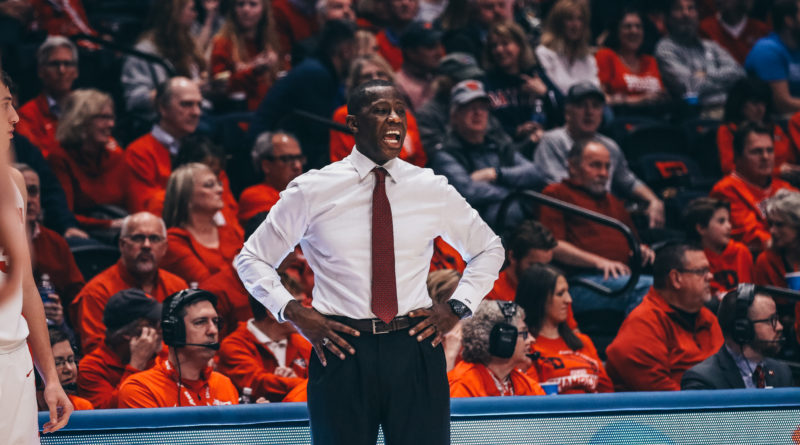UD Men’s Basketball head coach Anthony Grant joins March Madness 365 podcast
Anthony Grant joined college basketball analyst and host of March Madness 365 podcast to discuss a potential start time to the 2020-21 season and social injustice. Photo courtesy of Keegan Gupta/Flyer News.

Peter Burtnett
Sports Editor
With the college basketball oversight committee set to meet on Sept. 16 to discuss a potential start date for the 2020 season, UD men’s basketball head coach Anthony Grant joined Andy Katz’s podcast Tuesday to discuss a number of topics.
Grant was joined on the podcast by fellow guests and head coaches Matt Painter, Purdue, and Shaka Smart, Texas, to talk mainly about the potential start time, along with a meaningful discussion about social injustice and systemic racism.
As a member of the oversight committee, Painter was limited in what he could say, but both him and Smart said they hoped to see more widespread and easily-available testing, before Grant offered his opinion.
“I guess, at the end of the day for me, we’ve gotta do what’s best for the game and making sure that we all can get on the court safely,” Grant said. “But I guess I would say, ‘Give me the rules of the race,’ before I tell you what race I wanna run, right?
“So at the end of the day, if we’re gonna go to a late November start date, which means we’ll miss some opportunities to play some games early in the year that we’ve all scheduled, that we’ll lose. At Dayton, in the A10, those games are really important to us.”
The importance of games like Kansas in the Maui Invitational, even as a loss, was a key part of showing just how good the 29-2 Flyers were in 2019-20. Grant said losing those important games would effect how the team will be evaluated at the end of the season for the NCAA Tournament.
“I think it’s important that we look on the front end and control the controllables,” Grant said. “But I’d also like for the committee to consider, okay, what’s the criteria if some of those games can’t be replaced on the schedule and we lose some of those opportunities for teams in the A10 and other (mid-major) conferences, what are we being told?
“Because we don’t have the luxury of having those Quad 1 and Quad 2 games that maybe some of the Power 5s can get in their conferences. We won’t have access to those if we aren’t able to play.”
Grant said he spoke for the other mid-major conferences in wondering what the criteria would be if Dayton (and others) lose out on those Quad 1 or Quad 2 games that were originally scheduled – Mississippi State in Holiday Hoopsgiving game in Atlanta on Dec. 12; potentially Nebraska, Missouri, and/or Pittsburgh in Myrtle Beach Invitational, scheduled for Nov. 19-20, 22.
Katz then addressed his next questions around what a minimum number of games (regularly 31) would constitute a legitimate regular season and fit for Dayton to opt-in to the season.
“That’s a tough question,” Grant said. “If we go to the date of November 25, you’re talking about a window there to play maybe eight non-conference games, or there’s another recommendation that maybe you start the conference (games) first, I’m not sure which direction we’d end up going in. And then you’ve gotta also understand, you have final exams. Even though the kids won’t be on campus, I think, at least what we’re talking about, is after November, sending our kids home to finish out the semester… if you’re kids are taking final exams, you’re not gonna be playing games during that time, so how do you get 31 games in, where can you fit them in?”
Bubbles or “other things I’m not aware of” would interest Grant. A bubble idea has been floated around, and Smart cited it as potentially “expensive,” but Dayton could be in a bubble with Kentucky, LSU, Auburn, Memphis and other Power 5 programs.
Source: State Farm Arena in Atlanta has emerged as a possible location for a preseason bubble in college basketball.
10 teams are currently slated to play in the first annual "Holiday Hoopsgiving" event:
Kentucky/GT
Dayton/Mississippi St
Clemson/Alabama
LSU/USF
Auburn/Memphis— Jon Rothstein (@JonRothstein) September 8, 2020
The next topic of discussion was again centered around the importance of having non-conference games and when the coaches would want to know the parameters around selection for the NCAA Tournament.
“For the A10, the opportunity to play marquee non-conference games, traditionally has been huge for our league,” Grant said. “So I would assume that’s what our leaders would push for, based on whatever the (oversight) committee decides, then we’ll make that determination. And I think it needs to be made quickly because … whenever the regular season starts, it’ll push you in terms of when you actually start practice.”
Grant also said pushing back the start date would affect the practice schedule and what he has planned for the team, so “the sooner we can have those answers the better.”
Katz then suggested two separate scenarios: one being a bubble set-up where teams could go into a bubble environment and play as many games as a team would like, and two being a round-robin-type set-up where teams would play regional opponents (Katz suggested playing in Louisville, using Murray State as an example of a team that could come in). Grant said, “everything would be on the table,” and he agreed with both ideas.
Painter also went back to an idea floated by Grant earlier that suggested moving the non-conference play to the back end of the season. This format would allow teams to get the conference play done, and play non-conference games if possible.
Other issues discussed before moving on to social injustice and systemic racism included TV contracts and officials. More on those topics can be found in the podcast.
Smart, who started the discussion about what Katz called an “awakening for a large part of the population,” specifically highlighted what the impact will be moving forward beyond just posts made on social media.
“I think for our guys… this is not something that’s new,” Grant said. “And I think what’s been good to see amount of people – black, white, whatever – that have come out and said, ‘This has to change.’ And I think that’s different (than before).
“So it’s encouraging on one hand, but then you go from George Floyd to Jacob Blake. And there’s a level of discouragement that you get there. And so I think for our guys, the biggest thing that I’ve seen is more of a willingness, or desire, to get more educated on these types of subjects.
“Whether it’s just flat out racism that some have to deal with, or systemic racism and how it impacts communities and people, minorities. Or what we’re dealing with now, we’re in a cycle where we’re about to elect a president. And so, some of the things that go around voting that ultimately impacts some of the other areas.”
Grant also cited COVID-19 as having a disproportionate impact on minorities. He said his players have also benefited from seeing peers, and professional athletes standing up has provided an opportunity to “move the needle” and “impact change.”
For more sports news like Flyer News on Facebook and follow us on Twitter (@FlyerNews & @FlyerNewsSports) and Instagram (@flyernews)

